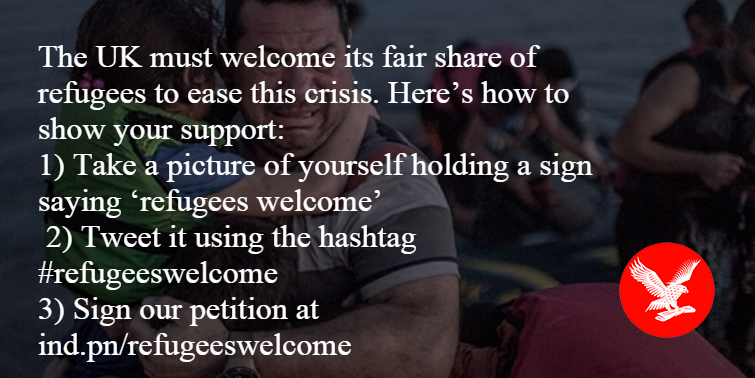David Cameron never expected to be outflanked by public opinion wanting him to be more liberal on migration. But that is precisely what happened last week as the British people demanded a more compassionate response to the refugee crisis. With no clear lead from the top, the Government suddenly found itself floundering, unable to field ministers on the media to defend a policy in flux.
Fortunately, in a sense, the Prime Minister has been as weak in the face of this unexpected turn as he has long been in the face of pressure in the opposite direction. From talking about ‘swarms’ and saying that taking in refugees would solve nothing, Mr Cameron suddenly said this was a moral issue and that Britain would take in “thousands more” from Syria and put officials to work on a statement to be delivered early this week.
For years the country’s loudest voices on migration have come from Nigel Farage’s Ukip. Mr Cameron has sought to appease them and his Eurosceptic backbenchers. We remember that even longer ago, however, when in opposition he tried to present himself as a new kind of liberal Conservative. Then, he called for a measured debate, although he set an unrealistic target of reducing net immigration to 100,000 a year.
That measured debate never materialised, and was quickly succeeded by an impression of a leader pushed this way and that by whichever subset of opinion made the most noise. Part of that may, of course, be the flexibility needed to make politics possible, and responsiveness to public opinion can be a good and democratic quality in a leader.
We fear, however, that Mr Cameron’s twists and turns reflect a more fundamental ambivalence in his character, which is shown by how hard it is to answer this question: what does he really think about the European Union? He came to the leadership of his party by adopting a more Eurosceptic position than his main rival, David Davis. Since then, he has tacked to the pragmatic middle ground, reluctantly accepting that it is in Britain’s interest to remain in the EU, while trying to minimise the damage done by his reluctance.
One official who worked with Mr Cameron describes him as “a Sunday Times Eurosceptic, not a Sunday Telegraph one”. In other words, he is interested in trade not sovereignty. The Prime Minister regards himself as being in tune with Britain’s moderate middle, sceptical in the true sense of the word about flowery Euro-idealism, but recognising our economic interest in staying part of the single market.
But there is more to Europe than mere accountancy, and it is not other-worldly idealism to realise that one of the EU’s purposes is to co-ordinate the response of countries in dealing with huge international problems such as migration.
George Osborne’s comments seemed to be an attempt to change the subject, by sounding hawkish about military action in the air over Syria. As Patrick Cockburn writes today, the advance of Isis in Syria is a threat, but it is not clear that airstrikes would make a difference.
If Mr Cameron cannot summon any solidarity with Germans who are welcoming refugees, perhaps he should help Angela Merkel because he will soon need her help to win his referendum. Why shouldn’t Britain be part of an EU-wide quota scheme to help refugees? The Prime Minister is right to say we need to deal with the problem at source, and is entitled to point out that Britain spends more on Syrian aid than the rest of the EU put together. But that is no excuse for failing to play our part in helping refugees too.
The gulf between Mr Cameron and Ms Merkel is making it harder to develop a united European response on migration, and it may in time put Britain’s membership of the EU at risk.
This newspaper has started a campaign for the UK to welcome a fair share of refugees.

Join our commenting forum
Join thought-provoking conversations, follow other Independent readers and see their replies
0Comments